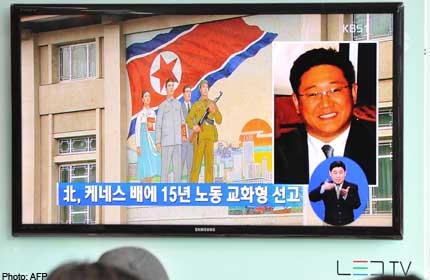US sends envoy to N. Korea to seek citizen's release

WASHINGTON - The United States is sending a senior envoy to North Korea to seek the release of an ailing Korean-American sentenced to 15 years hard labour, the State Department said Tuesday.
Kenneth Bae was tried at a time of high tension between the United States and North Korea over the reclusive nation's nuclear programme, on charges that he was trying to topple the regime of young leader Kim Jong-Un.
Despite earlier US goodwill trips that led to convictions being overturned, the North has staunchly denied that the hefty jail sentence was crafted as a diplomatic bargaining chip, and indicated that it wanted policy changes, not diplomacy, from Washington to secure Bae's freedom.
Pyongyang also said it would not invite any leading American to discuss the release of Bae, who is 44, but Ambassador Robert King's August 30 visit appears to be a reversal of that strategy.
A State Department statement said King, the US Special Envoy for North Korean Human Rights Issues, would travel to Pyongyang "at the invitation of the DPRK government" on a humanitarian mission "focused on securing the release of US citizen Kenneth Bae."
Bae, a tour operator whose Korean name is Pae Jun-Ho, was arrested in November 2012 as he entered the hardline communist state's northeastern port city of Rason.
North Korea, which strictly bans religious proselytizing, said Bae was a Christian evangelist who brought in "inflammatory" material.
The State Department and Bae's sister have said the Korean-American, whose sentence included long days of farm work, was recently transferred to a hospital due to deteriorating health.
"Ambassador King will request the DPRK pardon Mr. Bae and grant him special amnesty on humanitarian grounds so that he can be reunited with his family and seek medical treatment," the State Department said Tuesday.
The White House also released a statement on King's upcoming trip, urging "the government of North Korea to grant special clemency to Mr. Bae immediately and allow him to return home" with the US envoy.
Bae's sister Terri Chung said earlier this month that her brother has lost more than 50 pounds (23 kilograms) and has problems with his kidneys and liver.
In July, Bae said in an interview with the Chosun Sinbo newspaper he had been leading a difficult life in prison because he was suffering from diabetes, a fatty liver, hardening of the arteries and a pain in the waist.
North Korea has in the past freed detained Americans after visits from high-level emissaries such as presidents Bill Clinton and Jimmy Carter.
In the heat of the crisis over the communist state's weapons earlier this year, North Korea carried out its third nuclear test and threatened to strike the United States, but tensions have since eased.
America has been cool to North Korean overtures to restart talks, saying it is only interested in sitting down if Pyongyang commits to giving up its atomic weapons. But releasing Bae, something the US has been seeking for months, could help foster goodwill between the rival nations.
King has been in Asia since August 19, for a 10-day trip in which he was scheduled to discuss human rights in North Korea with officials in China, South Korea and Japan as well as North Koreans resettled in the South.
The United States and advocacy groups say that North Korea has perhaps the world's worst human rights record, with no dissent tolerated and severe repercussions for citizens who try to emigrate.
King was involved in an agreement on February 29, 2012, in which the United States said it would provide food assistance to North Korea, which has reported malnutrition.
But the United States suspended the agreement after North Korea, by then under the leadership of the young leader Kim, launched a rocket in April 2012.